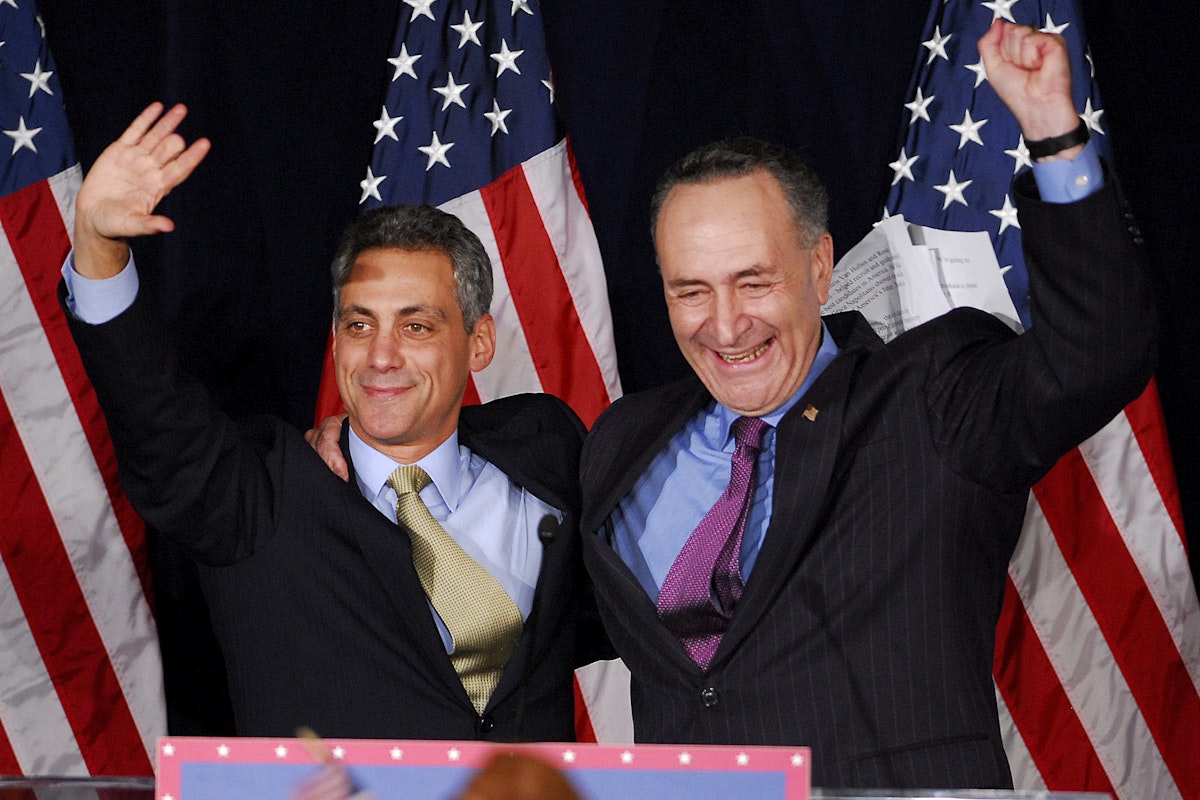Plan of Attack
The Democrats have won back the House. Rahm Emanuel, chairman of the Democratic Congressional Campaign Committee (DCCC), nearly tripped over himself on the way to the microphone to claim the credit. In fact, while the tidal wave in the House looks like a bit of strategic genius by Emanuel—and pundits are starting to call it that way (Howard Fineman on MSNBC noted that the Democrats even picked up a seat in Kentucky, where the 3rd District candidate was John Yarmuth—”Emanuel’s fourth choice!” Fineman exclaimed, as if in awe of the power possessed by Emanuel’s mere table scraps)—in race after race, it actually represents the apotheosis of forces Emanuel has doubted all long: the netroots. In two competitive House races in the Bluegrass State, Emanuel’s first choices lost by 9 and 12 points. In the 2nd District it was Colonel Mike Weaver, the cofounder of Commonwealth Democrats, a group of conservative Democratic state legislators. In the 4th, it was Ken Lucas, a former congressman whom Robert Novak recently called “moderate conservative” in a column Emanuel’s “recruiting coup” in coaxing Lucas out of retirement. Both were the kind of candidates Emanuel has favored in his famous nationwide recruiting drive. Yarmuth, meanwhile, was founder of the state’s first alternative newspaper, said things on the campaign trail things like “the No Child Left Behind Act ... is a plan deliberately constructed to create ‘failing’ schools,” and called for “a universal health care system in which every citizen has health insurance independent of his or her employment.” It was a pattern repeated across the country. New Hampshire’s 1st District delivered carol Shea-Porter, a former social worker who got kicked out of a 2005 Presidential appearance for wearing a T-shirt that said turn your back on bush. That might have been her fifteen minutes of fame—if, last night, she hadn’t defeated two-term Republican incumbent Jeb Bradley. For the chance to face him, however, she had to win a primary against the DCCC’s preferred candidate, Jim Craig—whom Rahm Emanuel liked to much he had the unusual move of contributing $5,000 to his primary campaign. Shea-Porter dominated Craig by 20 points—and then was shut out by the DCCC for general election funds. Not all Emanuel’s losing recruits were beaten in primaries. Some were beaten in the general election. Christine Jennings, a banker and former Republican gunning for Katherine Harris’s former House seat lost in a squeaker to conservative Republican Vern Buchanan. Dan Seals, a black moderate in the Barack Obama mold who criticized the Democratic Party even in speeches to Democratic crowds, lost to the Republican incumbent in Emanuel’s backyard, Illinois’s 10th District—as did the DCCC’s most talked-about recruit, Tammy Duckworth of Illinois’s 6th. Emanuel poured as astonishing $3 million into her campaign. It bought her a four-point defeat. Activists say the money would have been better spent on all the promising candidates to whom Rahm wouldn’t give the time of day. Many of them won anyway. John Hall is poised to become the Democrats’ version of Sonny Bono—a former environmental and anti-nuclear activist and co-author of the hit 1970s hit “Still the One,” he just won New York’s 19th District House seat. Chris Carney, now heading to Washington to represent Pennsylvania’s 10th, beat beleaguered incumbent (and alleged strangler) Don Sherwood. “Until Carney was ahead by double digits,” complained Howie Klein of DownWithTyranny, a blog that backed his candidacy, “Rahm wouldn’t take his phone calls.” Larry Kissell, a high school social studies teacher, is, as of this writing, in a statistical dead heat with an incumbent Republican from of all places, North Carolina. Says Klein: “If Rahm had a little bit of foresight to see this guy was for real, and to see that he was a candidate who could have won, a little bit of money would have made all the difference for him.” Still, Kissell didn’t go into battle unarmed. The thing all these successful candidates share in common is backing by the same dirty-necked bloggers and netroots activists that pundits have been calling the political kiss of death. Yarmuth, Shea-Porter, Hall, and Kissel—in addition to Democratic pickups Jerry McNerney in California, Joseph Sestak and Lois Murphy in Pennsylvania, Amy Klobuchar in Minnesota, Bruce Braley in Iowa, Kristin Gillibrand in New York, and Senators-elect John Tester of Montana and Sherrod Brown of Ohio—were all beneficiaries of a PAC called Blue America, a joint project of the blogs Firedoglake, DownWithTyranny, and Crooks & Liars. “Most of the candidates we support come directly from our readers,” Klein says. Some of their chosen beneficiaries were hopeless and remained so. The bloggers say that’s the risk you take when you’re trying to build a party infrastructure for the long term. Others were hopeless, however, only until the netroots-types got their mitts on them. When Klein decided that all Larry Kissell

The Democrats have won back the House. Rahm Emanuel, chairman of the Democratic Congressional Campaign Committee (DCCC), nearly tripped over himself on the way to the microphone to claim the credit. In fact, while the tidal wave in the House looks like a bit of strategic genius by Emanuel—and pundits are starting to call it that way (Howard Fineman on MSNBC noted that the Democrats even picked up a seat in Kentucky, where the 3rd District candidate was John Yarmuth—”Emanuel’s fourth choice!” Fineman exclaimed, as if in awe of the power possessed by Emanuel’s mere table scraps)—in race after race, it actually represents the apotheosis of forces Emanuel has doubted all long: the netroots.
In two competitive House races in the Bluegrass State, Emanuel’s first choices lost by 9 and 12 points. In the 2nd District it was Colonel Mike Weaver, the cofounder of Commonwealth Democrats, a group of conservative Democratic state legislators. In the 4th, it was Ken Lucas, a former congressman whom Robert Novak recently called “moderate conservative” in a column Emanuel’s “recruiting coup” in coaxing Lucas out of retirement. Both were the kind of candidates Emanuel has favored in his famous nationwide recruiting drive. Yarmuth, meanwhile, was founder of the state’s first alternative newspaper, said things on the campaign trail things like “the No Child Left Behind Act ... is a plan deliberately constructed to create ‘failing’ schools,” and called for “a universal health care system in which every citizen has health insurance independent of his or her employment.”
It was a pattern repeated across the country. New Hampshire’s 1st District delivered carol Shea-Porter, a former social worker who got kicked out of a 2005 Presidential appearance for wearing a T-shirt that said turn your back on bush. That might have been her fifteen minutes of fame—if, last night, she hadn’t defeated two-term Republican incumbent Jeb Bradley. For the chance to face him, however, she had to win a primary against the DCCC’s preferred candidate, Jim Craig—whom Rahm Emanuel liked to much he had the unusual move of contributing $5,000 to his primary campaign. Shea-Porter dominated Craig by 20 points—and then was shut out by the DCCC for general election funds.
Not all Emanuel’s losing recruits were beaten in primaries. Some were beaten in the general election. Christine Jennings, a banker and former Republican gunning for Katherine Harris’s former House seat lost in a squeaker to conservative Republican Vern Buchanan. Dan Seals, a black moderate in the Barack Obama mold who criticized the Democratic Party even in speeches to Democratic crowds, lost to the Republican incumbent in Emanuel’s backyard, Illinois’s 10th District—as did the DCCC’s most talked-about recruit, Tammy Duckworth of Illinois’s 6th. Emanuel poured as astonishing $3 million into her campaign. It bought her a four-point defeat. Activists say the money would have been better spent on all the promising candidates to whom Rahm wouldn’t give the time of day.
Many of them won anyway. John Hall is poised to become the Democrats’ version of Sonny Bono—a former environmental and anti-nuclear activist and co-author of the hit 1970s hit “Still the One,” he just won New York’s 19th District House seat. Chris Carney, now heading to Washington to represent Pennsylvania’s 10th, beat beleaguered incumbent (and alleged strangler) Don Sherwood. “Until Carney was ahead by double digits,” complained Howie Klein of DownWithTyranny, a blog that backed his candidacy, “Rahm wouldn’t take his phone calls.” Larry Kissell, a high school social studies teacher, is, as of this writing, in a statistical dead heat with an incumbent Republican from of all places, North Carolina. Says Klein: “If Rahm had a little bit of foresight to see this guy was for real, and to see that he was a candidate who could have won, a little bit of money would have made all the difference for him.”
Still, Kissell didn’t go into battle unarmed. The thing all these successful candidates share in common is backing by the same dirty-necked bloggers and netroots activists that pundits have been calling the political kiss of death. Yarmuth, Shea-Porter, Hall, and Kissel—in addition to Democratic pickups Jerry McNerney in California, Joseph Sestak and Lois Murphy in Pennsylvania, Amy Klobuchar in Minnesota, Bruce Braley in Iowa, Kristin Gillibrand in New York, and Senators-elect John Tester of Montana and Sherrod Brown of Ohio—were all beneficiaries of a PAC called Blue America, a joint project of the blogs Firedoglake, DownWithTyranny, and Crooks & Liars. “Most of the candidates we support come directly from our readers,” Klein says.
Some of their chosen beneficiaries were hopeless and remained so. The bloggers say that’s the risk you take when you’re trying to build a party infrastructure for the long term. Others were hopeless, however, only until the netroots-types got their mitts on them. When Klein decided that all Larry Kissell needed was a boost, he remembered how radio guys used to use long gas lines as promotional opportunities. Together, they arrived at an idea: Kissell would subsidize the sale gas at a filling station in his North Carolina district at the price it sold for when the incumbent had entered office—$1.22 a gallon. A line of cars soon stretched down the thoroughfare. The unknown Democrat was suddenly all over TV, shaking hands and pitching a hard Democratic message. He started inching up in the polls.
By the end of October, he was doing so well that Emanuel, finally smelling the pickup opportunity, added Kissell to DCCC’s “Red to Blue” fund-raising program. Emanuel had been too preoccupied to notice Kissell, Howie Klein complains: He already had a darling North Carolina candidate: Heath Shuler (who also won his election last night). But Shuler “won’t even commit to voting for Pelosi,” Klein groused. He “probably tossed a coin to decide if he was going to run as a Republican in Tennessee or a Democratic in North Carolina.”
The bloggers, blunt as they may be, think they have a better plan for building a lasting Democratic majority. Last night’s results suggest the rest of us should start taking it seriously.



